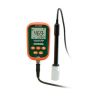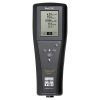YSI Pro30 Conductivity Meter
The YSI Pro30 simultaneously measures conductivity, specific conductance, salinity, total dissolved solids (TDS) and temperature (sensors sold separately).
Features
- 4-electrode conductivity cell is built directly into the cable bulkhead
- User replaceable cables with MS connector that locks into place
- Available with 1, 4, 10, 20, or 30-meter cable lengths
- Free ground shipping
- Expedited repair and warranty service
- Lifetime technical support
- More
Overview
The YSI Pro30 field conductivity meter simultaneously measures conductivity, specific conductance, salinity, total dissolved solids (TDS) and temperature. User-replaceable cables. The instrument also features Mil-spec (military spec) quarter-turn locking connectors, an IP-67 waterproof rating with rubber over-molded case, and 1-meter drop test rating.
Super-Stable 4-Electrode Conductivity Cell
Built directly into the cable bulkhead providing years of accurate data. The conductivity cells are designed for rugged field performance and are easily cleaned with a small conductivity brush.
Features
- Quick Cal routine allows calibrations with the push of a button; remembers previous calibration values and walks the user through the routine
- Stores 50 data sets
- Graphic, backlit display and glow-in-the-dark keypad
- View display with polarized sunglasses on
- Multiple languages include English, Spanish, French and German
- User-replaceable cables utilizing a robust MS connector that locks in place with a quarter turn rotation
- The conductivity cell is part of the cable bulkhead and is a proven, field-worthy electrode
- 3-year instrument; 2-year cable warranty
*Pro30 purchases include the instrument, manual, batteries, USB cable, and USB flash drive. Cables and probes are ordered separately.
- Cable Lengths: 1- 4- 10- 20- and 30-m lengths (3.28, 13.1, 32.8, 65.6 ft.)
- Certifications: RoHS, CE, WEEE, IP-67, 1-meter drop test
- Connector: MS (military spec) waterproof with bayonet lock
- Data Memory: 50 data sets
- Dimensions: 8.3 cm width x 21.6 cm length x 5.6 cm depth (3.25 in x 8.5 in x 2.21 in)
- Languages: English, Spanish, German, French
- Power: 2 alkaline C-cells providing approximately 400 hours of battery life depending on backlight usage; low battery indicator
- Warranty: 3-year instrument; 2-year cable and sensor
- Waterproof: IP-67 (even with the battery cover off)
- Weight with Batteries: 475 grams (1.05 lbs)
- Conductivity Reference Temp: Adjustable; range 15C to 25C
- Specific Conductance Temp Comp: 0 to 4%
- TDS Constant Range: 0.3 to 1.0
- (1) YSI Pro30 display
- (1) Operations manual
- (2) C-cell batteries
In The News
Warming Pacific releases methane equivalent to Deepwater Horizon spill each year
The ocean keeps secrets from surface to seafloor, and some even deeper still. A group of researchers from University of Washington discovered one such secret by accident — and their findings could change the scientific world’s understanding of climate change and its relation to the Pacific. “In 2013, we were preparing for a research expedition that had nothing to do with this,” said Evan Solomon, assistant professor of oceanography at UW. “We wanted to get a long-term record of bottom water temperature variability.” The team gathered conductivity, temperature and depth profiles off the Washington coast. A comparison with other research quickly revealed a long-term trend of warming in the area.
Read MoreResearchers pioneer continuous groundwater quality monitoring in Ontario
As a graduate student in Ontario, Jana Levison manually sampled groundwater wells in a hay field for a week straight. Now an assistant professor in the University of Guelph's School of Engineering, Levison is investigating how a new generation of water quality sensors can move the science forward while cutting the labor back. Levison said her doctoral work in a crystalline bedrock aquifer showed monthly variations in nitrate — a common groundwater contaminant often sourced to intensive agriculture — and daily variations in E. coli. Those short-term changes got her interested in watching groundwater in a more detailed manner. "Now we have the equipment that we can do that," Levison said. That equipment includes YSI's EXO multi-parameter sondes and Satlantic's SUNA nitrate sensor.
Read MoreIn Sierra Nevada streams, researchers on the lookout for drought-threatened fish
In the parched hills of the Sierra Nevada, researchers are surveying drought-weakened streams to see what effects long-term dryness is having on fish populations in the region. Their findings so far have been less than stellar, with sparse numbers of fish being counted. Still, as data collection is progressing, the researchers, who work out of the University of California, Davis’ Center for Watershed Sciences, are gathering insights that could aid in conservation efforts that are expected to grapple with coming climate changes. The purposes of the investigation are two-fold. “If we ever get rain again, we want to see how well these areas are recovering from drought,” said Rebecca Quinones, a postdoctoral researcher at the center and leader of the project.
Read More
























